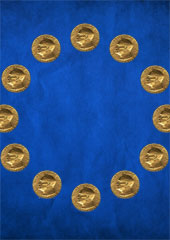Is Germany the Main Beneficiary of the Euro?
Does it make economic sense for Germany to try to hold the eurozone together?
October 18, 2012

Particularly in the South of the eurozone, it is argued that Germany (or the North, more generally) is the main beneficiary of the euro. According to this point of view, the Northern countries sustain jobs and growth at home by running an export surplus with — and taking jobs away from — the South.
The spinning of this tale is also advanced by prominent “Northerners.” Even Chancellor Angela Merkel and the German media do not tire of asserting that the euro brings Germany great advantages and that it is in the interest of Germany to defend the euro.
It is important to check the validity of these assertions. If it turned out that the euro was not an important source of economic gain and, on the contrary, an economic burden, it would be necessary to find other reasons for Germany to pay dearly to save the euro.
One such reason would be the argument that the political gain for Germany outweighs the economic cost. By implication, the political cost for Germany of leaving the euro would be very substantial.
The political argument is hard to quantify. Suffice it to say that the case is by no means clear. Germany never wished to act as a European leader precisely to avoid being criticized for dictating its will to member countries.
Providing massive financial support without any say, however, is not a responsible way of managing the euro either. But changing ineffective rules to conform more to German policy convictions or influencing policy in crisis countries is profoundly resented as well, and leads to anti-German sentiments.
Since Germany tries to act by influencing the policies of the European institutions, there is even the risk that Europe and the whole European idea is losing its attractiveness. Not being part of European arrangements — such as the euro, or the Schengen Area, or the European social model — is increasingly considered as fortunate in parts of Europe.
It seems, therefore, to be increasingly doubtful if it helps Europe — or if it helps Germany politically — to remain in the euro.
The economic argument is easier to deal with. It is clear that a well-functioning monetary union provides gains. They were doubtlessly exaggerated by the EU, but they are real.
The gains arise in a static sense from saving the costs of currency conversion and the absence of exchange rate uncertainty. There is also the benefit of avoiding abrupt changes in competitiveness stemming from exchange rate movements.
Foreign exchange conversion costs are real, but relatively small. Exchange rate uncertainty is easily hedged, and the movements of real exchange rates have been as pronounced in the eurozone as before. Therefore, there are gains in a static sense, but they are too small to make them fight for the euro.
Dynamic gains would materialize from an increase in investment to generate more growth. Such an increase would potentially occur if the eurozone provided more stability and allowed more trade to exploit economies of scale.
As real exchange rate stability did not materialize (since there are no exchange rate movements inside the eurozone, the real exchange rate movements are equal to the relative inflation rates), there is little reason to expect that investment and growth in the eurozone gained significantly.
Using IMF data, the investment rate in the eurozone countries was two percentage points lower during 2000-10 than during 1990-2000. The growth of the eurozone’s GDP was slightly above 2% during 1990-2000 and only close to 1.5% during 2000-10.
Even during the years before the crisis, average growth was lower than 2%. In other words, dynamic gains cannot be seen even before the crisis.
So even if the crisis had not occurred, the economic gain from the euro is not obvious. Adding in the cost of the crisis turns it into a negative-sum game. The case for maintaining it is therefore not compelling for any member country.
Perhaps it is the case that some countries (Germany?) gained massively, while others (the South?) lost to add up to a negative gain?
The euro brought stability and international acceptance to countries that were unable to domestically achieve that. The only country that had achieved these advantages before the euro was Germany, along with the countries that had pegged their currencies to the deutschmark.
Therefore, it was not Germany that gained in stability and international acceptance, but the South. Interest rates declined substantially in the South and made the financing of high public debt levels easier.
Low nominal interest rates close to German levels and higher price inflation turned the real interest in the South negative and provided the incentives for overborrowing. The gain, then, was for the South — though it was a treacherous gain that led to the crisis.
As a result of historically low interest rates in the South, it was perfectly rational to maximize borrowing. Thus, overborrowing was not a Southern vice, but a consequence of allowing interest rates in already highly indebted countries to converge to German levels.
It was and still is a European objective to avoid risk spreads (European solidarity!), a political view that abstracts from economic reality and is one of the major causes of the crisis.
The no-bail out clause was never really credible, and in the end this lack of credibility was proved correct. The crisis was not an accident. It was the result of a misconception of the eurozone’s rules.
The trade factor
What about the North’s exports to the South? It first may be useful to put Germany’s current account surplus of 5.5% of GDP (in 2012) into some perspective.
The Netherlands is running a current account surplus of 7.7% of GDP in 2012. Outside the eurozone, Sweden has a 6.7% surplus and Switzerland 13.2%.
Germany has surpluses in its trade with countries outside the eurozone as well (growing at a higher rate than its surplus with the eurozone). And it always had surpluses before German unification.
During the 1990s, unification temporarily pulled resources from foreign trade to rebuilding the East. The fact that Germany’s current account surplus has been growing since 2000 is not due to monetary union but is a return to trend.
Is a current account surplus a gain and a deficit a loss? This is an old — and fundamentally flawed — mercantilist idea. A current, yearly account surplus represents a country’s net investment abroad during that year. The level of foreign net investment is the sum of past current account imbalances.
If a country wants to receive funds from abroad on a net basis, it must run a current account deficit. There is no other way!
Would any Southerner be ready to argue that it would have been preferable for the South to lend money to Germany — rather than receiving money from Germany? Anybody taking Germany to task for its current account surplus is basically asking just that.
Has this lending been profitable for Germany? If Germany does not get its money back with interest, then the answer is definitely no. But even if Germany does get its money back, it is does not represent a gain for Germany. (Note that the fault is not with the receivers, but with German policy.)
A permanent surplus of the current account implies that a vital part of national savings is invested abroad rather than at home. For example, in 2011, the national savings rate of Germany was 23.7%. Instead of investing all of it in Germany, only 18 % was invested at home and 5.7% (i.e., the current account surplus) was invested abroad.
An individual investor may only look at his return on capital, but an investment at home creates jobs, output and taxes in the future. If the South had invested these loans productively then Germany would have transferred jobs in the future from the North to the South, not the other way round.
Unfortunately, the borrowing from Germany and other sources was consumed by higher incomes and real estate speculation.
So what can we learn from the data? In the early 1990s, Germany’s investment rate was around 25%. It had fallen to 22% in 2000 — and to 18% in 2011. The fall in investment in Germany was even more pronounced than for the eurozone as a whole.
Germany’s growth rate during the 1990s was, on average, 2.25%. It had fallen to 1.25% during 2000-07 (before the crisis set in) and to roughly 0.05% during 2007-12. So German growth fell even more than the eurozone’s.
Indeed, for all the years Germany has been in the eurozone, its growth has been anemic at best — even lower than the eurozone’s average growth rate. The economic gains from Germany’s membership in the euro is simply not there.
The reason the German public thinks its economy is robust and growing strongly is that 2010 and 2011 were good years. It has forgotten that Germany’s output had fallen dramatically in 2009.
What, then, would have happened if Germany had not joined the euro? Would it be a poorer country now?
The experience of countries like Sweden, Denmark or Switzerland suggests otherwise. They all were able to maintain price stability, even more so than the eurozone — and their growth was better than the eurozone’s (and Germany’s).
The expected gains from a monetary union failed to materialize even before the crisis and turned into a massive loss since the outbreak of the crisis. And the main loser from this poorly designed monetary union is Germany, partly because it failed to bring about a proper design and adequate membership.
Takeaways
If it turned out that the euro was an economic burden, it would be necessary to find other reasons for Germany to pay dearly to save it.
Would Germany be a poorer country had it not joined the euro? The experience of countries like Sweden, Denmark or Switzerland suggests otherwise.
The fact that Germany's current account surplus has been growing since 2000 is not due to monetary union but is a return to trend.
Would any Southerner be ready to argue that it would have been preferable for the South to lend money to Germany?
Germany never wished to act as a European leader precisely to avoid being criticized for dictating its will to member countries.
Read previous

Europe’s Nobel and the Sine Wave of War
October 17, 2012
